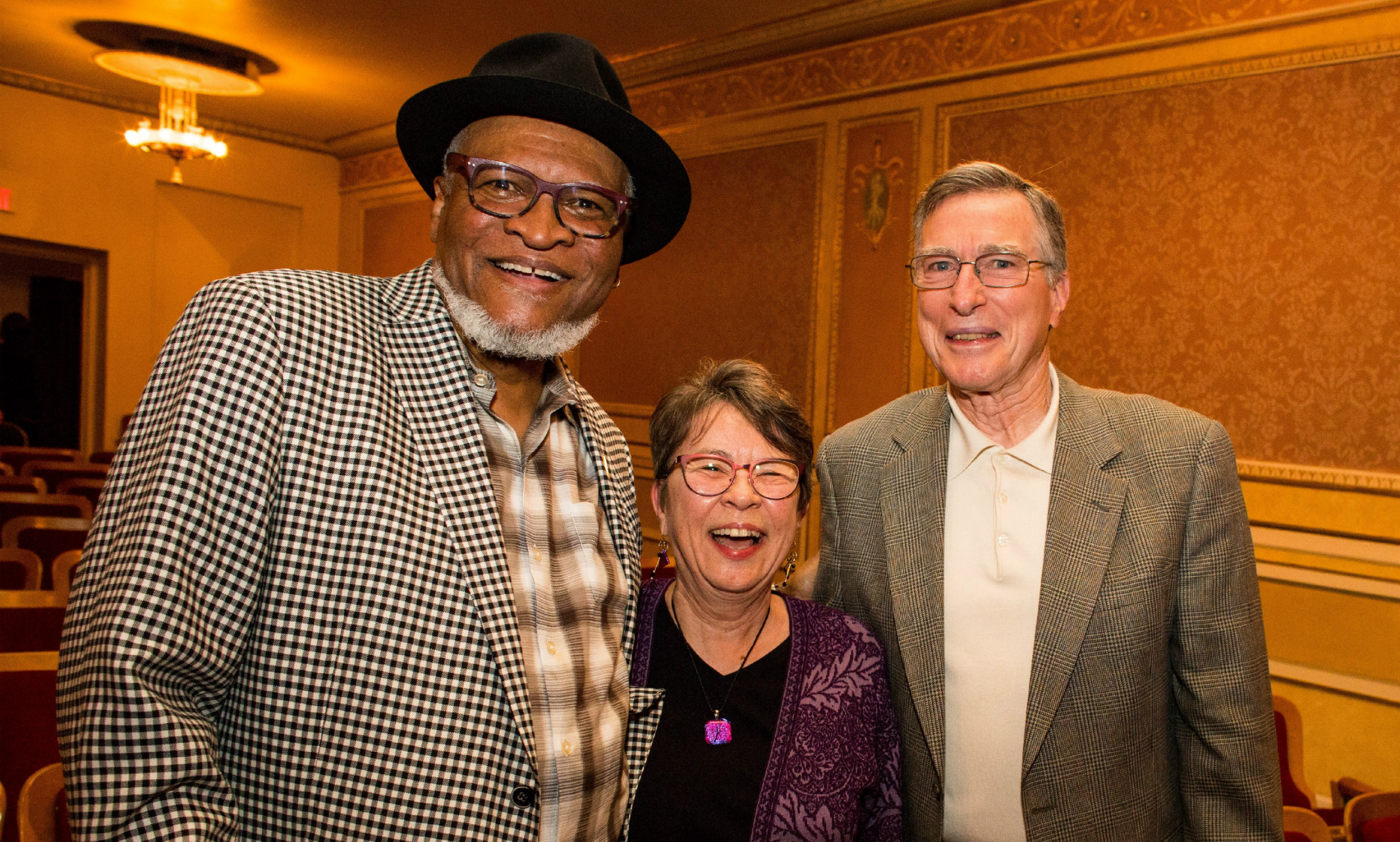
Individual and foundation giving have common theme for UMKC Conservatory student success
Bobby Watson and Vinson Cole have been influential professors at the UMKC Conservatory in addition to being internationally recognized musicians.
Cole recently retired from his role as Professor of Voice and Watson will step away from his role as the William D. and Mary Grant/Missouri Professor and co-coordinator of Jazz in the fall of 2020. In recognition of their outstanding commitment and contributions to the UMKC Conservatory, local donors have created scholarships in their honor to provide future students the opportunity to follow their passions.
Bobby Watson
A renowned saxophonist, composer and native Kansas Citian, Watson has worked with jazz icons such as Max Roach, Louis Hayes and Wynton Marsalis. For three decades, Watson lived in New York City and performed with and composed for some of the most acclaimed jazz performers in the world. He has recorded 28 records and appears as a leader on dozens of recordings.
In 2000, he returned to Kansas City and joined the faculty of the UMKC Conservatory. While teaching at the Conservatory has been a passion – “I bleed blue and gold,” he says – it has never been his intention to stay forever.
"I bleed blue and gold." - Bobby Watson
“I thought after 20 years I’d stop and reflect,” Watson says. “It seems like the right time. I’m still young enough to go on the road. And we’ve brought the school to a high level.”
Long-time Conservatory and Watson enthusiasts, Sarah and Jim Weitzel, have shared a passion for music since they first married. When they learned of the musician’s retirement, the news was bittersweet.
“When Bobby announced that he was retiring so that he could play, we wanted to honor that,” Sarah Weitzel says.
Wanting to recognize Watson’s contribution to the Conservatory and provide opportunities for future students, the couple decided the timing was right to establish an endowed scholarship in Watson’s name.
“We didn’t need to name the scholarship after us,” Weitzel says. “We don’t have a legacy in jazz – Bobby does. We are hoping other people will contribute to the scholarship in his honor.”
Watson was overwhelmed by the gift.
“I was speechless, humbled, honored and flabbergasted,” Watson says. “It’s a great honor and a great gift. Every scholarship that we can award our students is life changing.”
Vinson Cole
Vinson Cole, (BM ’72) is an American tenor and retired Professor of Voice. He was flattered when he received the news from Michael Fields, on behalf of the Richard J. Stern Foundation for the Arts - Commerce Bank trustee, that the foundation wanted to establish an annual scholarship in his name to benefit students at the Conservatory.
“Vinson Cole was the perfect choice for a named scholarship at the UMKC Conservatory,” Fields says. “The Richard J. Stern Foundation is committed to excellence in the arts in Kansas City, and Vinson definitely represents the highest standards of excellence.”
"I listen for what someone can do – open their heart, their soul, their body and mind.” - Vinson Cole
Fields notes that Cole is perhaps better known internationally than he is in the city where he was raised, however Richard Stern certainly knew Cole and followed his career.
“It’s nice to be recognized for what I’ve done, especially in Kansas City,” Cole says of his hometown.
Cole began singing as a young child and has fond memories of his voice teacher.
“He had so much knowledge,” Cole remembers. “I wanted everything. I would ask and ask and ask. All I wanted was the work.”
Cole’s career has been successful by any measure. He is internationally recognized as one of the leading artists of his generation. A frequent guest of the most prestigious orchestras throughout the world, he has collaborated with some of the greatest conductors of this era. When he teaches, his focus is firmly on his students. In auditions, he pays attention to the voice, but his focus is broader.
“I listen for what someone can do – open their heart, their soul, their body and mind.”
Beyond the honor of the recognition of his dedication, Cole knows first-hand how significant scholarships are to students.
“It’s great that there is help for people who want to come to school who can’t afford it,” he says. “I know a lot of students who come to school and always need money. I was always spending my money on music when I was in school – mounds of sheet music.”
While today’s students usually store their music on iPads, their expenses are still significant.
“These scholarships will be significant awards for talented students, and we are grateful for donors like the Weitzels and the Stern Foundation who generously support Conservatory programs and students,” says Conservatory Dean Diane Petrella. “Bobby and Vinson have been valuable members of our community and we look forward to keeping them involved with the Conservatory. Their legacies at UMKC will live on through the students who receive the gifts of these scholarships.”
For additional information on the Bobby Watson and Pamela Baskin-Watson Scholarship or the Vinson Cole Scholarship contact Mark Mattison at mattisonm@umkcfoundation.org
Jan 31, 2020
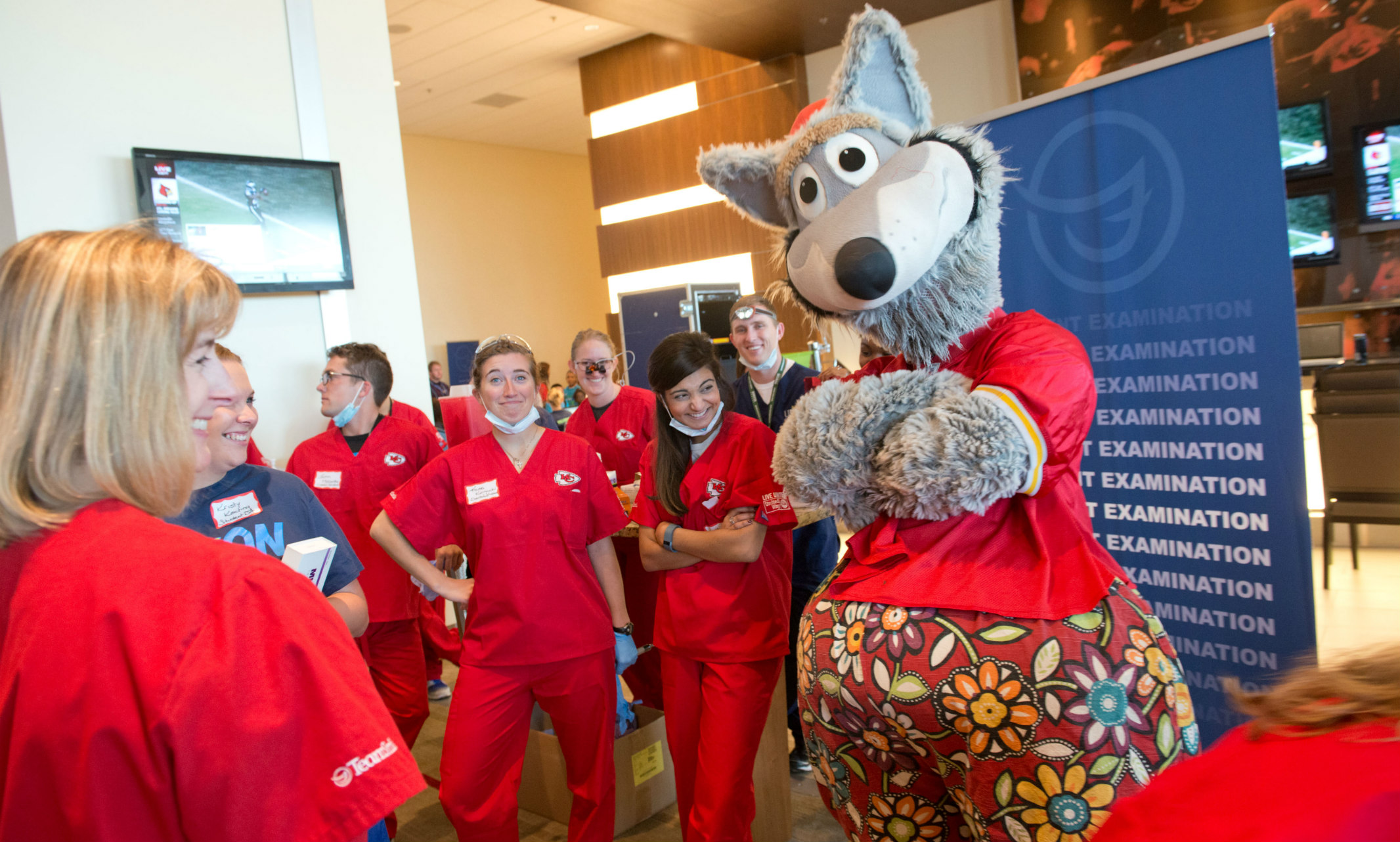
UMKC dental students provide care through the efforts of Chiefs player Dustin Colquitt and TeamSmile
There are plenty of reasons to smile with the upcoming Chiefs’ Super Bowl. Chiefs’ punter, Dustin Colquitt, has long championed TeamSmile, a national advocacy group that provides children in need with a life-changing dental experience through the power of sports. Since the organization’s inceptions, UMKC School of Dentistry students and faculty have also worked hand-in-hand in this amazing effort.
TeamSmile is in the news due to the generosity of Colquitt, who went above and beyond for a recent patient and a longtime Chiefs fan. At a recent home game – for which they were his guest – he surprised the family with a trip to the Super Bowl. Little did they know, it’d also be the first Chiefs Super Bowl in 50 years.
Each year, UMKC students and faculty team up to volunteer at three TeamSmile events – at Kansas City Chiefs, Royals and Sporting KC. The students see about 300 children, providing provide initial screenings, X-rays and recommendations for what care the kids need for that day.
Accompanied by UMKC School of Dentistry faculty members Becky Smith, Eileen Cocjin and Michael McCunniff; 18 dental students from two dental student groups, Students Take Action and the Pedodontic Dentistry Club, volunteer at the outreach events.
According to Smith, it’s the breadth of care provided at TeamSmile events that impresses her when she participates.
“The impressive thing about TeamSmile is the variety of procedures that are provided,” Smith says “They don’t limit themselves to just preventative care like fluoride and sealants. These kids are getting everything from extractions to root canals.”
“They look in the mirror and see what we’ve done, and they realize, ‘Oh my gosh, this kind of changed my life.’” — Dustin Colquitt
Started in Kansas City, TeamSmile has gone nationwide, partnering with oral health organizations as well as professional and college athletic teams. It began in the Arrowhead Stadium parking lot now has partnering with 17 NFL franchises, providing millions of dollars in free dental care.
"I have participated at four Team Smile events including at the Chiefs stadium," says Tara Craven, D.D.S. '21, and president of Students Take Action. "The kids love coming to get their teeth checked and the program has a whole day of activities planned for them. When the players come to visit they all light up! They love the high-fives and fist bumps offered by the players — including Dustin Colquitt! The volunteers all love seeing the players as well and it’s an amazing day full of giving back and helping kids get jazzed about taking care of their teeth!"
So why is Colquitt involved? For him, it’s the kids’ reactions that really drive home the importance of dental care and how TeamSmile can help.
“We feel like in 20 minutes, we can change a kid’s trajectory, meaning that a lot of our kids are hiding what they have going on in their mouth,” Colquitt says in a promotional video. “They look in the mirror and see what we’ve done, and they realize, ‘Oh my gosh, this kind of changed my life.'”
According McCunniff, UMKC became involved with TeamSmile nearly at the inception of the organization. In 2007, co-founder Bush was planning his first one-day outreach event at Arrowhead Stadium but needed portable equipment since his existing dental practice equipment wasn’t going anywhere. Not only did UMKC provide the equipment, but also student and faculty volunteers.
For McCunniff, he hopes the opportunity inspires his students to come up with their own initiative.
“I challenge the students that when you get out in the field, make your own legacy with an initiative like this,” McCunniff says.
Although he hasn’t heard, yet, of a former student take him up on that challenge, he has received the next best thing. According to McCunniff about half of the participating dentists in the Kansas City-based TeamSmile events are alumni of UMKC.
“The kids love coming to get their teeth checked ... When the players come to visit, they all light up! They love the high-fives and fist bumps ... it’s an amazing day full of giving back and helping kids get jazzed about taking care of their teeth!” — Tara Craven, D.D.S. '21
According McCunniff, the school even has an alum who worked on both sides of the organization. Prior to dental school, alumni Caitlin Silverstein (DDS ‘16) was a staff member for TeamSmile. Once in school, she continued to volunteer at every event and now as dental practitioner herself, McCunniff sees her at nearly every event.
The example of the commitment to TeamSmile is a testament to the UMKC School of Dentistry, says Dean Marsha Pyle.
“Instilling in our students the importance of volunteerism is a pillar of our institution,” Pyle says. “By showing our students how meaningful these experiences can be, we hope to encourage a lifelong passion for giving back.”
Jan 30, 2020
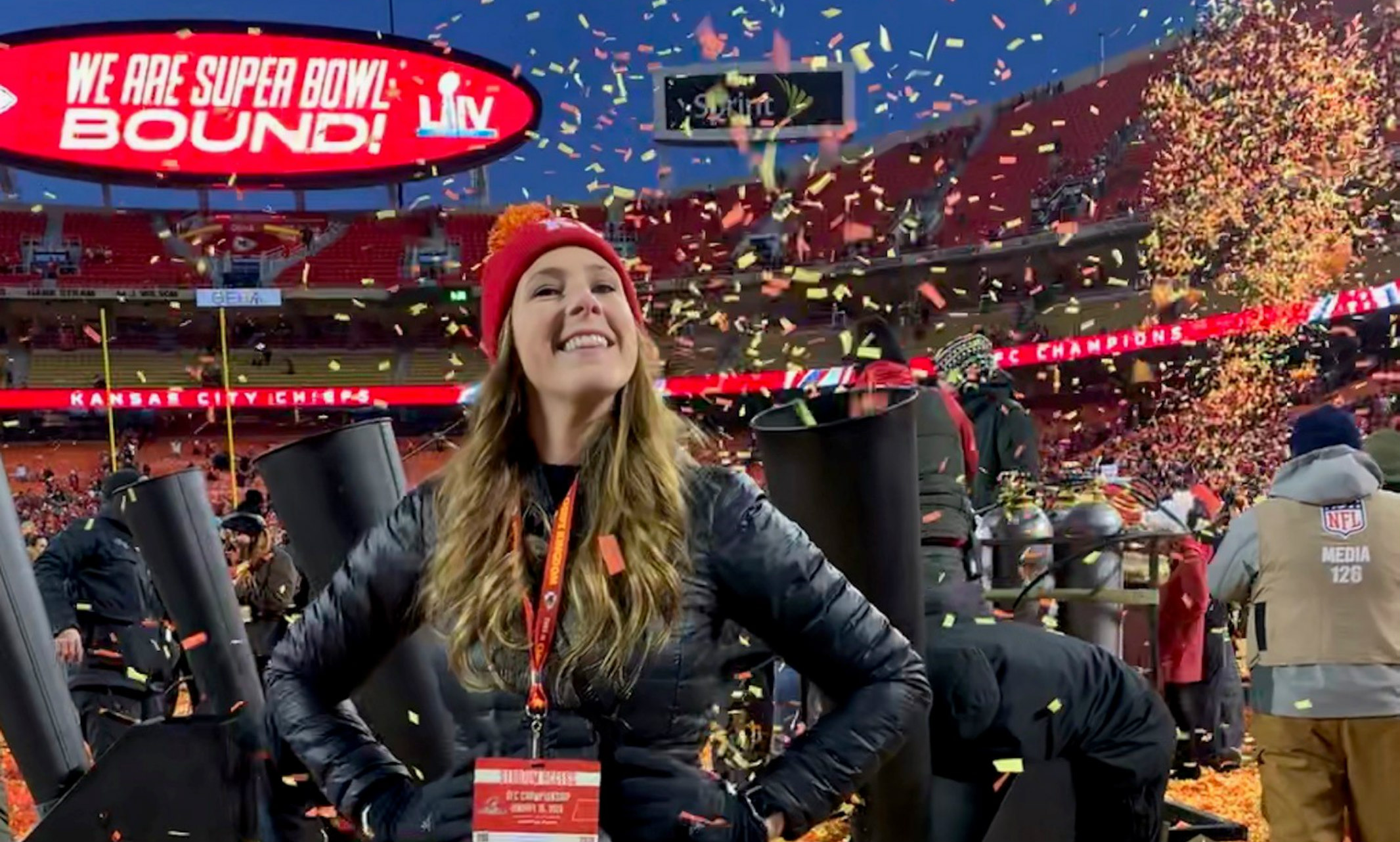
Meghan Dohogne, Arrowhead Art Collection Fellow, works with team, artists on community outreach projects
Name: Meghan DohogneHometown: Cape Girardeau, Missouri High School: Notre Dame Regional High School Undergraduate Degree: History with minors in Painting and Art History, McKendree University, Lebanon, IllinoisGraduate Degree: Master’s Degree in Art History from UMKC in 2016UMKC degree program: Interdisciplinary PhD with a core discipline in history, secondary in humanities consortium.
IPhD student Meghan Dohogne is an Arrowhead Art Collection Fellow. The position is more specific than a general internship and connotates a higher level of specialization and achievement, which is important because only graduate students are eligible to receive it.
What is the Fellowship Program with the Arrowhead Art Collection at Arrowhead Stadium and why did you apply?
The fellowship is a partnership between the UMKC History Department and the Kansas City Chiefs. I applied for it as my graduate research position through the department. The length of each fellow’s tenure is dependent on a few factors and varies based on their position in the program.
What kind of work do you do?
The AAC fellow is responsible for supporting the Arrowhead Art Collection. Day to day, I work with artists for the outreach events we participate in throughout the community. Recently we ran an African mask-making workshop at Central Middle School lead by AAC artist Lonnie Powell.
Another responsibility I have is to support recent acquisitions by collaborating with Sharron Hunt, chairwoman of the collection, to write the education materials. In addition to the educational materials, I support press events that are typically covered by many news outlets around the city.
Another area I have chosen to focus my fellowship around is community partnerships and raising awareness for the collection. Each day is an opportunity to support the organization that has given me so much insight into the engine that is professional sports.
What are your career goals?
I am excited at the number of opportunities I am preparing for, but I haven’t settled yet on exactly which direction I will pursue. I currently co-own a research company called D2 Research with fellow UMKC graduate student Poppy Di Candeloro. We pursue arts management and historical research. Working with different organizations and members of the community has been extremely rewarding.
What has it been like working at Arrowhead this season?
Holy smokes, working for the Chiefs organization right now is electric. I’m thankful for the opportunity to have experienced this season with a great group of people who all want to see the Chiefs do well. As for the collection, everyone should come see it! It’s a fine example of Regionalism and a lot of care has been put into its inclusion as part of the Arrowhead experience.
What advice do you have for someone considering an internship or fellowship?
Finding a place where your creativity is embraced and celebrated is great for your personal career growth. I have been able to spearhead some events that have given me the opportunity to really develop professionally. The Chiefs have placed a lot of trust in me and allowed me the space to try out some big ideas.
Jan 30, 2020
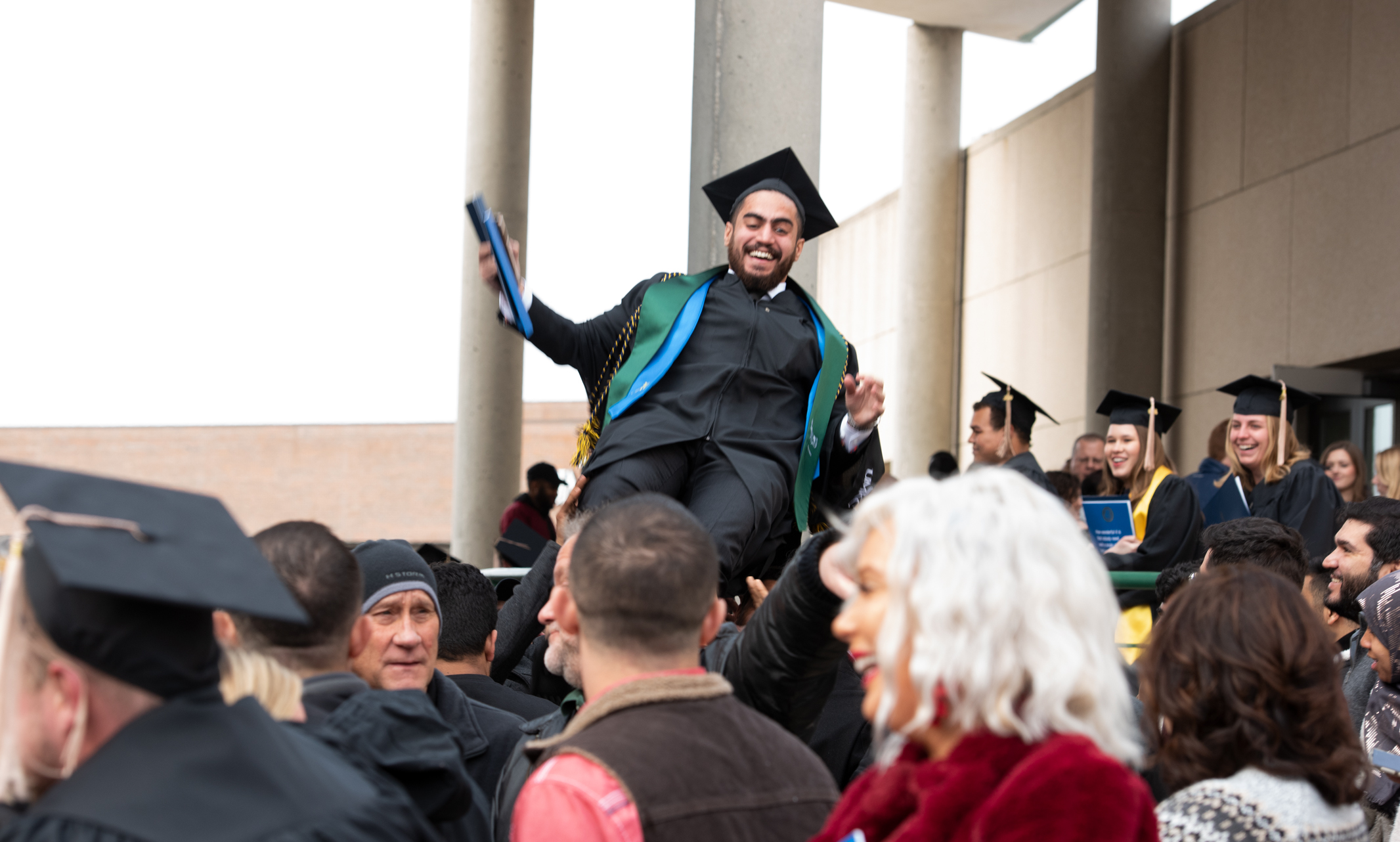
Standardized test scores no longer required in applications
Responding to strong evidence that high school grades are a more reliable predictor of college performance than standardized test scores, UMKC is joining the growing movement to make such test scores an optional component of the admissions process.
With this move, the university is providing more opportunities for qualified people to pursue a college degree.
Under the test-optional admissions process, if applicants have performed well in high school, they do not need to take a standardized test, such as the ACT or SAT, to be considered for admission. If an applicant does decide to take such a test, reporting the scores to UMKC is optional.
“This is a better way. Now it's the UMKC way.”— Alice Arrendondo, director of admissions
“We made this decision as part of our ongoing commitment to create opportunity. It is in the best interest of the people who live in our community, the workforce needs of our employers and the overall economic development of Greater Kansas City and the state of Missouri,” said C. Mauli Agrawal, chancellor of UMKC. “We are proud to be the first university in the UM System to adopt this approach, as we join a growing number of U.S. colleges and universities—more than 1,000 so far—who have established similar practices.”
Applicants remain free to take standardized tests and have the scores reported to UMKC. These scores also will continue to play a role in admission to certain specialized programs and some scholarship opportunities.
“This is a better way," said Alice Arredondo, director of admissions at an announcement event. "Now it's the UMKC way.”
“For UMKC to become test-optional will be a game changer for students like me. I get test anxiety ... and I worried whether I’d get accepted into UMKC.” — Sadie Billings, senior
The move to test-optional admissions, however, is an evidence-based, educationally sound approach. There is substantial evidence that these tests are less-reliable predictors of the academic potential of traditionally underserved applicants. According to “Defining Access: How Test-Optional Works,” a 2018 study commissioned by the National Association for College Admission Counseling, applicants who chose not to submit standardized test scores with their college applications ultimately graduated at rates equivalent to—or marginally higher than—those who did submit scores.
“For UMKC to become test-optional will be a game changer for students like me,” said Sadie Billings, a communications major who will graduate in May. “I took the ACT six times – six times! — only to score the same each time, one point short at 21. I get test anxiety anyway, and I worried whether I’d get accepted into UMKC.”
Billings, who made a 4.0 in high school, eventually was accepted at UMKC with a strong recommendation to take mentoring and academic-coaching classes. Now a senior peer academic leader, she’s applying to graduate schools because she wants to work in higher education in programs that help students like her who have what it takes to succeed — no matter the test score on a standardized test.
“This is a change in admissions practices, not a change in the academic standards we enforce. The value of a UMKC degree, and the educational attainment it represents, are unchanged,” Agrawal said. “We are committed to providing every qualified individual an opportunity to leverage their talent and effort to contribute to our economic development and find life and career success.”
Learn more about Test-Optional Admission
Jan 29, 2020
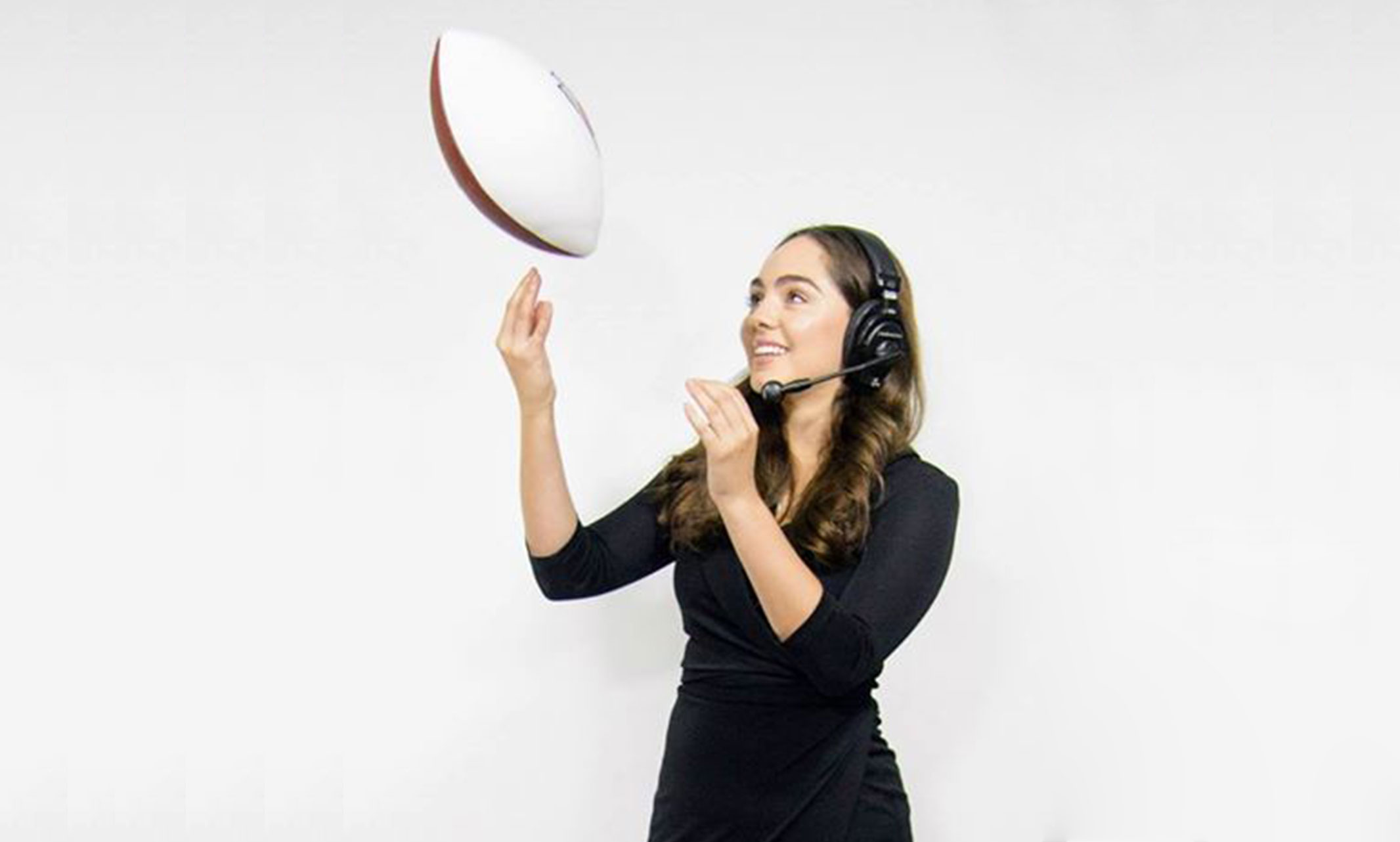
Hannah Bassham's job with Tico Sports has her covering the first Chiefs Super Bowl in 50 years
Our ongoing story starts with people from around the world, converging here at UMKC. Get to know our people and you'll know what UMKC is all about.
Name: Hannah Bassham Hometown: El Paso, Texas High School: Pembroke Hill Undergraduate Degree: Criminal Justice from Texas Christian University (TCU) UMKC degree program: J.D./MBA joint degree program Anticipated graduation year: May 2020 for my J.D. and December 2020 for my MBA
Third year law and business student Hannah Bassham is also in her third year with Tico Sports, which provides the official Spanish language coverage of the Chiefs. She spoke with us recently about how she landed the job, her role in Super Bowl LIV and her scoring prediction for Sunday.
How did you get involved with broadcasting and Tico Sports?
I have been a big Chiefs fan since I was a young girl. After undergrad, I was searching for the perfect law school to attend. At the same time, I came across the opportunity to join the Tico Sports family. They were looking for a Spanish-speaking female who was also a football fanatic to join their broadcast team and asked if I would work for them. Since UMKC has a wonderful law school and Tico Sports had a great opportunity for me to be connected with Chiefs football, I realized Kansas City was the perfect place for me to move to and I have been pursuing these two passions ever since.
What’s your role with Tico Sports?
Tico Sports produces the Chiefs’ official Spanish radio broadcast. In my first year with Tico Sports I worked as a spotter and statistician in the booth to support the color and play-by-play commentators during the broadcast. I was promoted to work as a sideline reporter during my second year with Tico, and this year, along with being the sideline reporter for the broadcast, I took on the role as host of our halftime show. Our halftime show often features interviews with players and community leaders as well as commentary on other games around the league. After each game, I go into the Chiefs locker room for interviews and attend the post-game conference to hear Coach Andy Reid and Patrick Mahomes speak to the media.
What will you be doing on Super Bowl Sunday?
On Super Bowl Sunday I will be in Miami working for Tico Sports as a sideline reporter. As a sideline reporter, I report on weather conditions, injured players, stadium atmosphere and provide general commentary on what I see from my vantage point on the sideline next to the Chiefs bench. I will also host our halftime show which I now call “El Mejor Show de Medio Tiempo” (The Best Halftime Show). You can listen to our broadcast by downloading the Chiefs app and clicking the “radio” prompt in the upper right corner to select the “Tico Sports Español Radio” option or by tuning into La Mega 1160 AM and KPPZ-LP 100.5 FM in Kansas City.
Is there a way you see using both your law and broadcasting experience together in the future?
I truly hope that my experiences in both law and broadcasting will merge at some point in the future. Law school has been such an incredibly challenging learning experience and along with my experience in broadcasting, I have grown so much in just three years. I can’t help but to think my experiences in both fields have given me new skills that will help me in any career to come.
Guess for final score on Sunday?
I anticipate seeing a high-scoring game this Sunday with both teams scoring over 28 points. That being said, if I have learned anything from these past few weeks, it is that the Chiefs are unpredictable and wildly entertaining to watch week in and week out.
Bassham with her Tico Sports coworkers outside Arrowhead Stadium. Courtesy of Tico Sports.
Favorite thing about covering the Chiefs?
My favorite thing about covering the Chiefs is having the opportunity to see such an amazing organization at work. I love getting to work side-by-side with talented people who make the Chiefs who they are. As a whole, the Chiefs organization is humble, hard-working, brilliant and grateful to be in the position they are today. I am ecstatic just to be a spectator to the incredible achievements that the entire organization has accomplished together.
Jan 29, 2020
UMKC's announcement of a new test-optional admissions process made headline news throughout Kansas City and beyond.
UMKC going to test-optional admissions Kansas City Star
How Much Influence Will UC’s Faculty Have? Inside Higher Ed
UMKC eliminates mandatory ACT, SAT scores from admissions process KSHB
UMKC makes admissions now test-optional KCTV5
UMKC decides to not consider ACT scores in enrollment. Hour 3 1/29/2020KMBZ Radio
At UMKC, students are more than test scores. New admissions policy is about inclusion Kansas City Star
Why are so many US universities going test-optional?Study International
ACT, SAT scores are no longer required for admission to UMKCAssociated Press
Will University of California dump SAT and ACT? Not yet University Business
UMKC admissions become test-optional University News
Jan 29, 2020
Kansas City Business Journal interviews Jannette Berkley-Patton
Jannette Berkley-Patton has taken her research to the pews. In fact, the professor and director of the Health Equity Institute at the University of Missouri-Kansas City is wrapping up a five-year clinical trial with the same name. Read more.
Jan 28, 2020
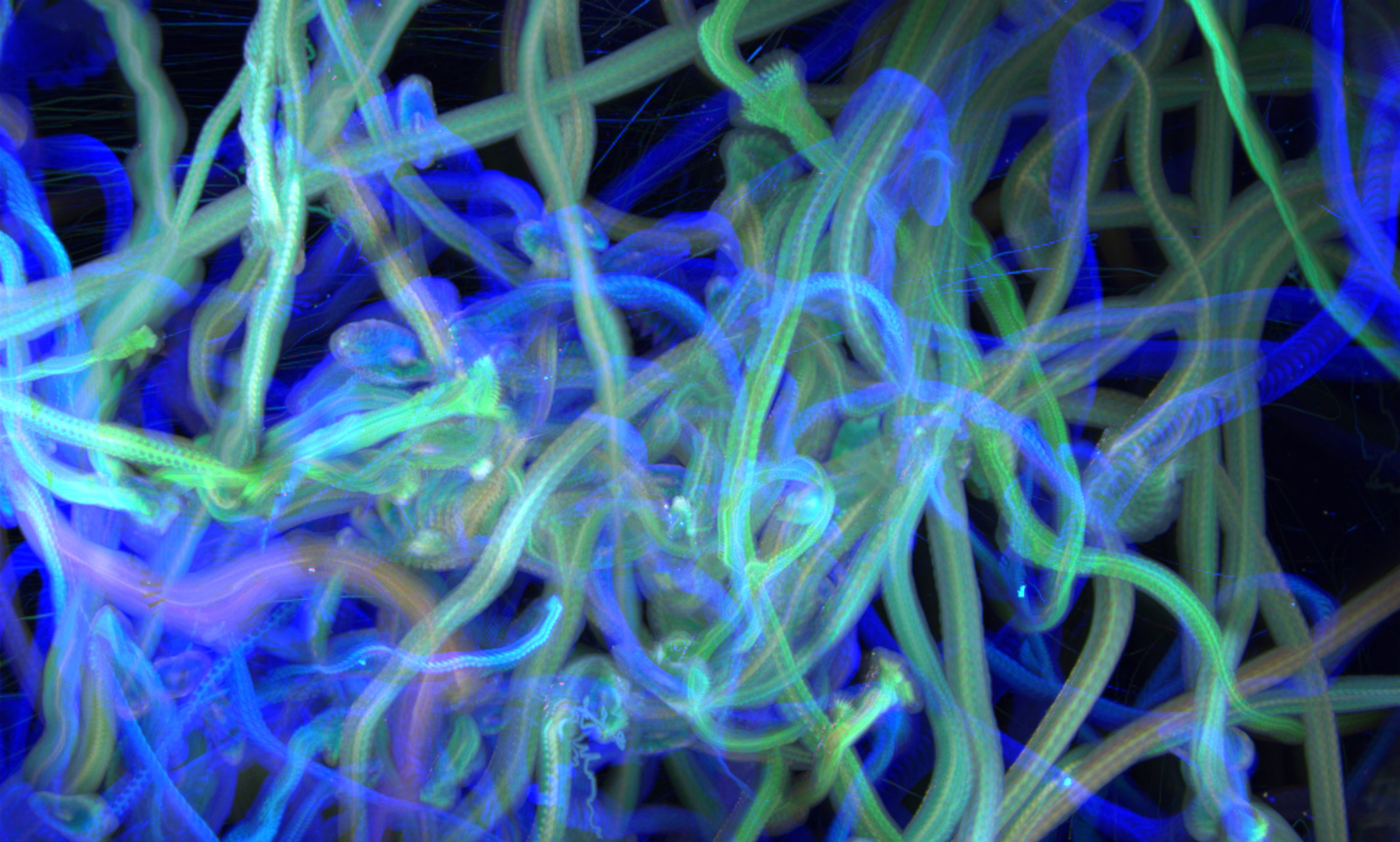
UMKC Gallery of Art exhibition features a collaboration between art and science
The University of Missouri-Kansas City Gallery of Art and The Stowers Institute for Medical Research present a new exhibition, “Body of Inquiry: The Art, Biology and Being of Flatworms,” with an opening reception from 5 to 8 p.m. on Thursday, Jan. 30, at the UMKC Gallery of Art, Room 203 in the Fine Arts Building, 5015 Holmes St., Kansas City, Missouri.
The exhibition asks the questions, What if you could clone yourself from a small piece of your fingertip? What if you could self-regenerate? What if you were essentially immortal? Scientists have found the answers in the planarian flatworm and local scientists are sharing that through art.
“For the planarian flatworm, these human fantasies are reality,” said Nowotarski. “And they’re all around us all over the world, from fountains in Barcelona, to lakes in Mexico, to nearby Brush Creek.”
The exhibition is a collaboration between art and science, two seldom, yet undeniably intertwined, fields. In the multi-disciplinary exhibition “Body of Inquiry,” sensory perception, curiosity, and creative problem-solving converge in order to provide both valuable insights into an unseen world, and beautiful art from an unlikely source.
Four intergenerational local artists put the exhibition together. They include retired Kansas City Art Institute fiber chair Jason Pollen, recent KCAI graduate William Plummer, and Stowers Institute artists and research scientists Mol Mir and Steph Nowotarski. They wanted to understand and expand upon the connection between art and science, so they plunged into local waterways and emerged with a greater appreciation for the complexities found there. They explored the role of the planarian flatworm in our local ecosystem then translated their findings to a broader scope. This exploration facilitated the cross-disciplinary dialog which led to Body of Inquiry.
This immersive installation celebrates the joy of discovery, inviting visitors to engage with and observe planarian flatworms in a variety of perspectives. Explore our interpretations and examine your own through the use of video projection, live planarians, and visual responses from each artist. This exploration offers insight and helps to answer the question: what can these flatworms teach us about being human?
The UMKC Gallery of Art hours are 9 a.m. to 5 p.m., Monday through Friday. The exhibition runs through March 7 at the UMKC Gallery of Art.
Jan 27, 2020
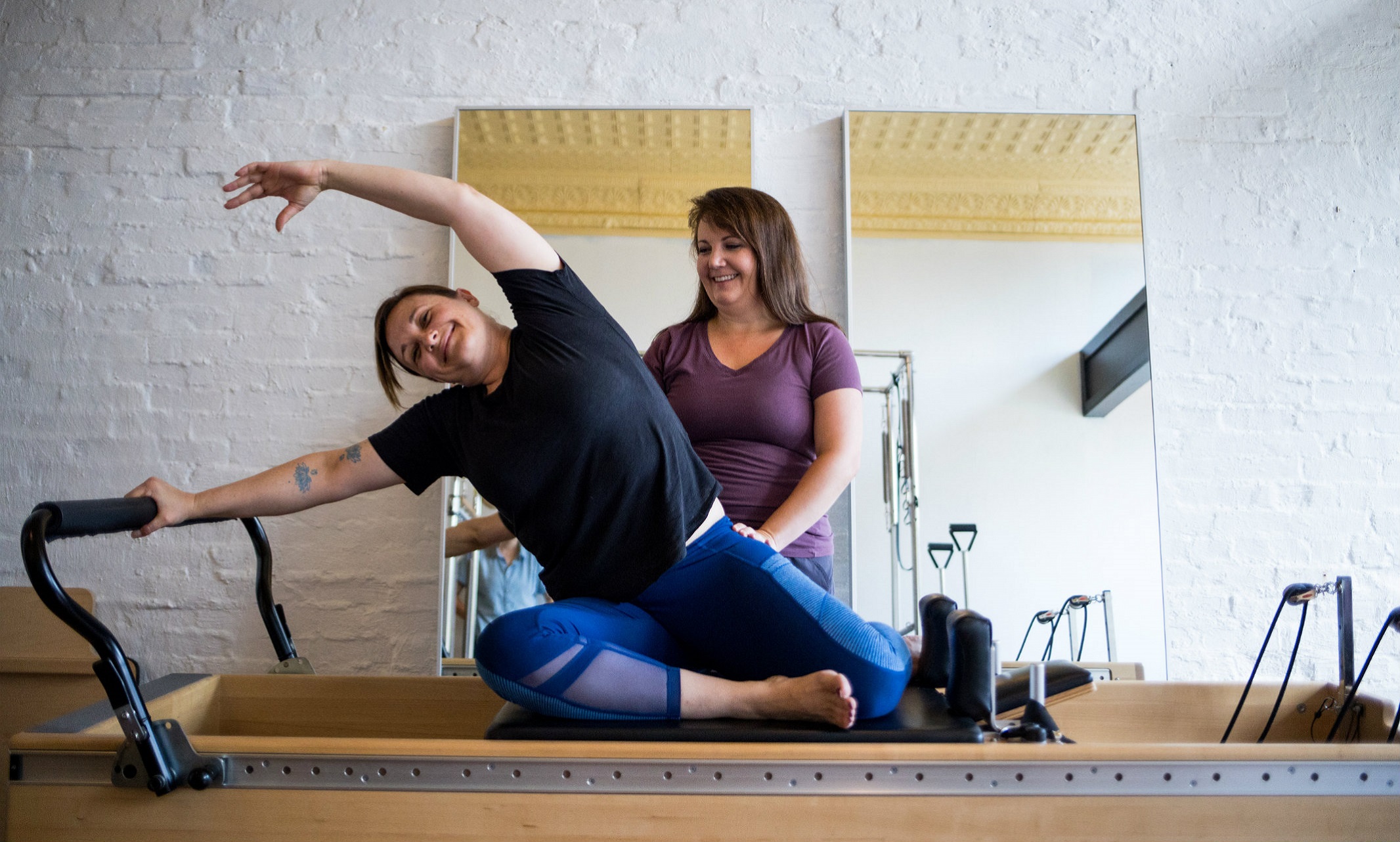
Lauren Thompson draws on diverse background for unique brand of wellness
Earning degrees in dance, psychology, and counseling and guidance with a minor in gender and women’s studies may sound like a meandering path to a career, but alumna Lauren Thompson (B.F.A. ’09, B.A. ’09, M.A. ’12) knew she could make all her interests come together.
Thompson’s unique brand of wellness comes together at her Pilates studio, Thrive Pilates, in Kansas City’s Westside. But her work goes far beyond what happens in that cozy space. The connections she makes with her clients are aimed at benefitting the whole person — not just their body composition.
So many interests, so little time
Thompson will be the first to tell you: It wasn’t exactly a straight path to her current line of work.
Thompson says people were often skeptical when they learned she was pursuing such different courses of study. She got the same question many college students get when selecting a major (or two) without a crystal-clear job description: “What are you going to do with that?”
Anyone asking that question hadn’t realized the connection between mind and body, she says, “but I was living it. It was so clear to me how those degrees worked together. Eventually, everyone else caught up.”
As an undergraduate at UMKC, Thompson would dance for six hours a day, then go to her psychology classes. Along the way, she also decided to get a minor in gender and women’s studies. And she didn’t stop with her undergraduate degrees. A year after graduation, she was back at UMKC, pursuing her master’s in counseling and guidance, with a focus on mental health.
Around this time, Thompson started teaching Pilates and yoga classes, a way to combine her backgrounds in dance and psychology that would turn out to be a crucial thread through her many work experiences.
When she was offered a job working with sex offenders in maximum security at Lansing Correctional Facility in Leavenworth County, Kansas, she took it. Though that job offered many challenges, Thompson calls it a “blessing” — just another step on the path to where she is today.
Making her own way in the wellness world
During this time, Thompson was teaching and exercising less, usually taking only one yoga class a week. She was frustrated that she wasn’t moving her body more, so she put formal counseling aside and went back to teaching yoga and Pilates full-time. But even the studios where she taught brought some frustration.
“I couldn’t really teach the way I wanted to teach,” she says. “And I couldn’t control the messaging, which I am hypersensitive about because of my knowledge of mental health.”
She realized it was time to open her own studio, incorporating her wide range of training and experiences. She wanted to meet the multifaceted needs of women from both physical and mental health perspectives, and her diverse background gave her the skills she needed to do it.
“I think the important thing is to not compare yourself to other people. There’s so much wasted energy for women on comparing. I feel lucky that I had the training early to help me block that.” —Lauren Thompson
“One of the things that we address is that a lot of exercise and training is developed for the male body. That can be a problem for a number of reasons,” she says. “It’s not as if women can’t do these things, but there are times when many exercises are not appropriate.”
Thompson notes that the constant physical fluctuations of women’s bodies — menstruation, pregnancy and menopause — deserve acknowledgement in the wellness world.
“Men’s health is relatively linear. They don’t experience the same kind of cycles that women do,” Thompson says. “We know that girls playing soccer experience significantly more ACL tears correlating with menstruation. It’s similar to the hormones from pregnancy that cause joints to be less stable.”
In addition to being in tune with individual physical needs, Thompson pays close attention to her language.
“The idea of ‘skinny equals healthy’ is false, and that mentality is mostly what we hear from the fitness industry,” she says. “I think it’s shame-based, and shame-based motivation never works. Intensity is not going to treat you well.”
Thompson practices the balance that she preaches. While work is important to her, she is active in the Kansas City arts and dance communities, using her Conservatory training to choreograph and participate in collaborative art projects. She also works on zoning and development issues in her Westside neighborhood, which has become popular with developers.
While managing her work in wellness, art and community development, Thompson works hard to stay healthy and grounded.
“I think the important thing is to not compare yourself to other people. There’s so much wasted energy for women on comparing. I feel lucky that I had the training early to help me block that.”
This story originally appeared in Perspectives magazine, vol. 29.
Jan 24, 2020
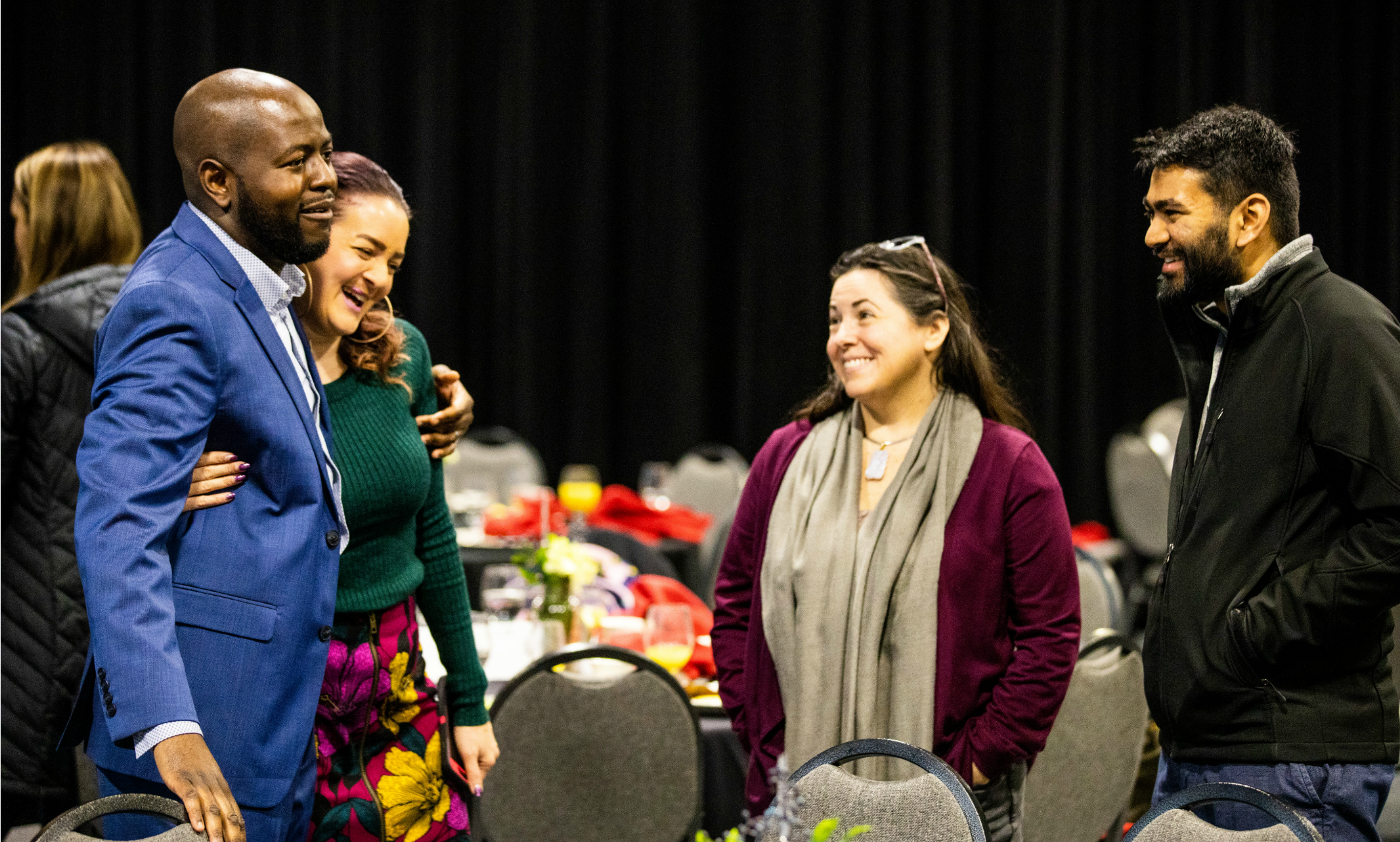
Alumnus Chiluba J. Musonda reflects on his experiences as an immigrant while honoring the legacy of Dr. King
The African American Student Union (TAASU) Freedom Breakfast was created to not only commemorate the legacy of Dr. Martin Luther King Jr. but to promote unity and harmony within our community and celebrate the university’s values of diversity, inclusiveness and respect.
This year marked the 30th anniversary of the breakfast and saw student tributes in music and dance. Alumnus Chiluba J. Musonda (B.B.A. ’09, M.P.A. ’12) spoke about his journey from Lusaka, Zambia, to Kansas City, Missouri.
Student dancers Ivyana Robinson, left, and Jayla Johnson perform during the TAASU Freedom Breakfast.
Musonda’s migration to the United States began with five words in a Yahoo search: mid-sized American colleges – affordable. Sifting through more than a hundred results, he applied to four universities. UMKC was the first and only university to respond.
“I am no different than any immigrant that comes to America,” says Musonda, now director of operations at Kansas City Museum and author of “Home Away from Home.” “Everyone comes seeking a ‘better life.”
He stresses that what most people fail to recognize is the bravery and emotional cost that comes with leaving your family, home and country behind.
Musonda recalled a moment in 2007 when he received a call from his sister saying that his mother was robbed at gunpoint in Zambia. He realized then that there was nothing he could do to help and the feeling of being alone in the U.S. sunk in. He cites UMKC and the people around him with helping him pull through the dark moments.
“Each one of us has a responsibility to help others,” Musonda said as he encouraged attendees to remember the words of Dr. Martin Luther King Jr.: “Whatever affects one directly, affects all indirectly.”
Members of TAASU honored UMKC staff member Todd Wells with The Dr. Joseph Seabrooks Jr. Leadership Award. Pictured from left to right: Blessing Onwundinati, Brenda Reed, Makini Morrison, Jayesha Griffin, Brandy Williams, Todd Wells, Jarinar Robinson.
Jan 24, 2020
The Hollywood Reporter recognizes UMKC Theatre program
UMKC Theatre has been named as a top design school by The Hollywood Reporter. Read more.
Jan 24, 2020
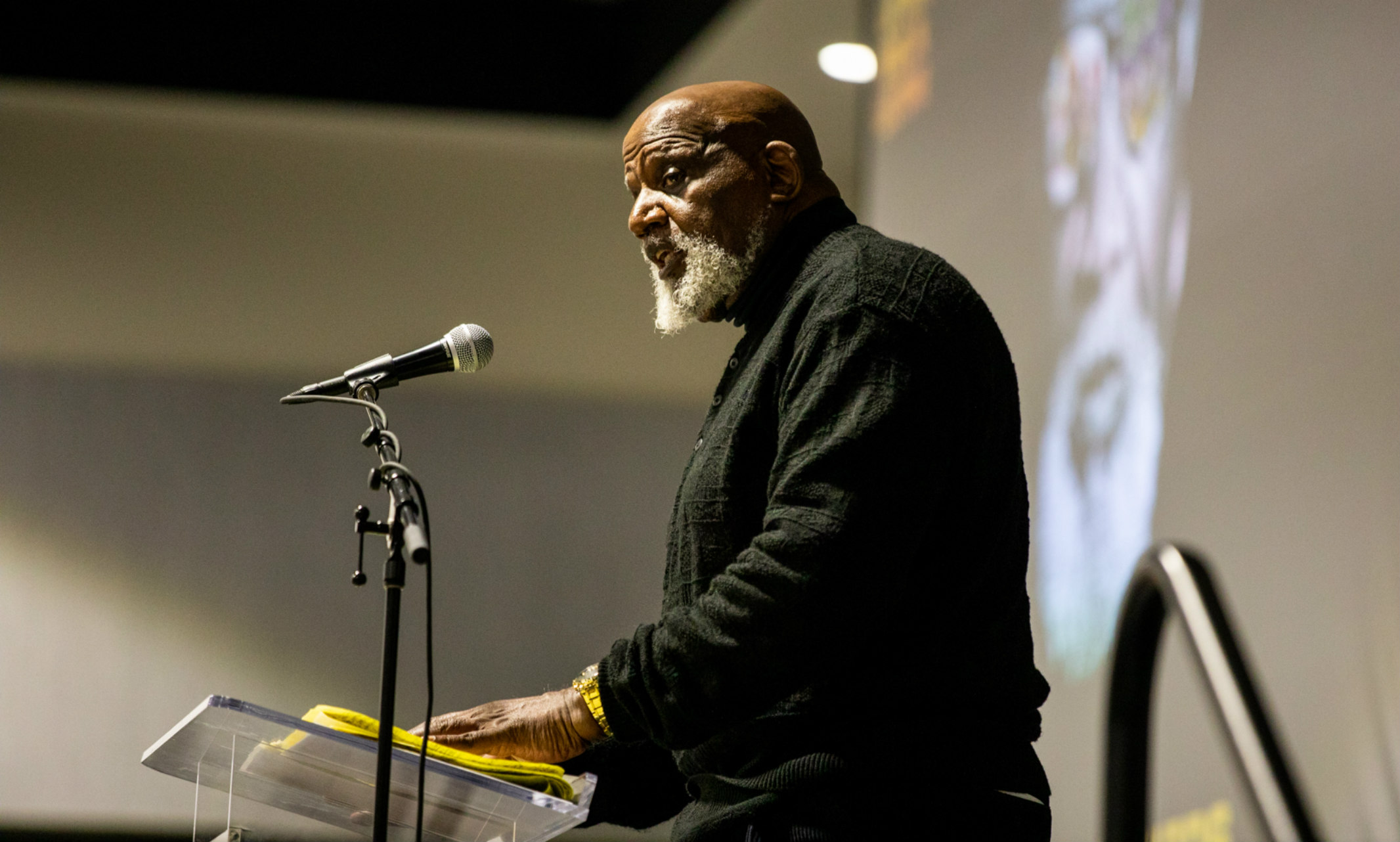
Renowned sports activist and sociologist Harry Edwards was featured speaker
Speaking to a full crowd of community members during the 12th annual Martin Luther King Jr. Lecture Series, Vice Chancellor of Diversity and Inclusion Susan Wilson said that “we’re still fighting civil rights struggles from economic to social justice” in the United States. She reminded attendees, who piled into Pierson Auditorium to hear from sports activist and sociologist Harry Edwards, Ph.D., that the struggle is not over that King was fighting to overcome.
Each year the Division of Diversity and Inclusion brings social-justice thought leaders to UMKC to provide insight and advocacy to current rights issues of education, economic and justice inequalities. The goal of the lecture series is to encourage the campus and Kansas City community to build upon the courageous, non-violent activism of civil rights leaders like Martin Luther King Jr. and to increase awareness of present day avenues to advocate for social justice through free thought, action and scholarship. This year’s discussion was a timely fit as discourse surrounding former San Francisco 49ers quarterback Colin Kaepernick’s kneeling protest against police brutality and, even more fitting, the Kansas City Chiefs are headed to the Super Bowl. Here a few takeaways from Edwards' lecture.
“The challenges of our circumstances are diverse and dynamic. Our struggle, therefore, must be multifaceted and perpetual and there are no final victories.”
Each wave of athlete activists — more times than not — is directly tied to a social justice movement in the broader community.
Wave 1: Plessy V. Ferguson and Establishing Legitimacy
Edwards shared that to understand resistance athletes, we must begin at the turn of the 20th century — the collapse of reconstruction and the passing of Plessy vs. Ferguson: racial segregation under the guise of separate but equal public accommodations. This law is what led to the development of viable, vibrant and parallel black social and cultural institutions — historically black colleges and universities, fraternal and community organizations and sports — constituted by an ongoing resistance amongst black people.
“Human rights emphases carried the perceived potential to enhance the dignity and respect of black people.”
Achievement by black athletes on the world stage became a feature of African-American resistance to the oppression imposed upon them in America under Plessy vs. Ferguson. This model of black excellence was a direct contradiction of race-based claims of black inferiority and would be reiterated throughout history.
Excellence at home through black sports teams and excellence abroad led to the first wave of athlete activism: an effort to establish the legitimacy of blacks in America.
Wave 2: Establishing Access
Edwards said America underwent a talent pool shortage after WWII due to war casualties, which is what ultimately caused sports officials to fill gaps with black talent in revenue-producing sports like baseball, basketball and track and field.
“When you look at collegiate athletics, blacks are virtually underrepresented, especially when it comes to giving scholarships… except in basketball, football and track and field.”
According to Edwards, athletes like Jackie Robinson modeled the path for the larger civil rights movement in American society and served the interest of advancing the black struggle against racial segregation and oppression, as well as mainstream sports.
“Women have always been a part of every movement, but this movement is about women.”
He shed light on how sports was a reflection of what was happening in the broader society and how athletes were the first to take nonviolent direct action against racism and oppression years before King led nonviolent protests in the South. Black clergy and community organizers were taught nonviolent direct action so that sports spectators knew how not to respond when they witnessed their star athletes’ mistreatment on and off the field.
“They knew that if there had been a riot in the stands, it would spill into the streets and vice versa if players fought back on the field” and that would hinder them from furthering their push for access both in sports and the community.
“The culture of sports has not changed. It is about a transactional reality.”
Wave 3: Human Rights – Why Should We Play Where We Can’t Work?
After the onset of desegregation and, largely due to what civil rights accomplished, millions of people were left leaderless and hopeless.
The trajectory of efforts of young, militant blacks such as the Black Panther Party, shifted to the concern for human rights and human rights development.
“Human rights emphases carried the perceived potential to enhance the dignity and respect of black people,” Edwards said.
He further explained that it was no longer enough to have access, athletes demanded respect and dignity. He used Muhamad Ali as a prime example of how black athletes fought for dignity and respect for race, name and religion and drew a line to highlight how Ali’s fight opened the door for Barack Obama to eventually become the 44th president of the United States.
The third wave of resistance athletes — Ali, Jim Brown and others — was fueled by the Black Power Movement. Each movement has a trending expiration date of about six years, 10 at the most. There was no movement by 1972. Edwards said there were athletes between 1972 and 2012 who were prominent, but not as remembered because most athlete activists are tied to larger movements.
“The culture of sports has not changed. It is about a transactional reality.”
Wave 4: Black Lives Matter
Edwards tied Kaepernick’s protest to the Black Lives Matter movement and the quest for social justice, further noting that current activists have social media at their disposal and are able to use their power and influence to call on their followers to protest.
“This generation is about the exercise of power.”
Wave 5: Gender Equality
The WNBA donates $5 of every ticket sale to Planned Parenthood.
“Women have always been a part of every movement, but this movement is about women.”
Young women are more dependent on services offered under the Affordable Care Act and nonprofit health care clinics. Edwards said if those go away, it will constitute a direct threat on the existence of women’s sports, and women are already beginning to react to it.
“The challenges of our circumstances are diverse and dynamic,” Edward said. “Our struggle, therefore, must be multifaceted and perpetual and there are no final victories.”
It’s not the activists who created the struggle, Edwards said, but the athletes who are participating in their leg of the struggle. He said there will always be a movement, which is why we’re constantly in pursuit of forming that more perfect union.
“It will never be perfect but the struggle to get there is what will be part of what is in the very fabric and soul of American society.”
Learn more about Diversity and Inclusion at UMKC
Jan 23, 2020
KCUR features Gus Jacob of School of Education
Gus Jacob, assistant teaching professor at the UMKC School of Education, was a guest on Central Standard.
Homework has been a cornerstone of education since as long as anyone can remember. As schools trend towards more homework at younger ages though, public opinion on its value is shifting. Lots of parents and researchers don't think it makes sense. How much homework is too much and at what age? Listen for more.
Jan 21, 2020
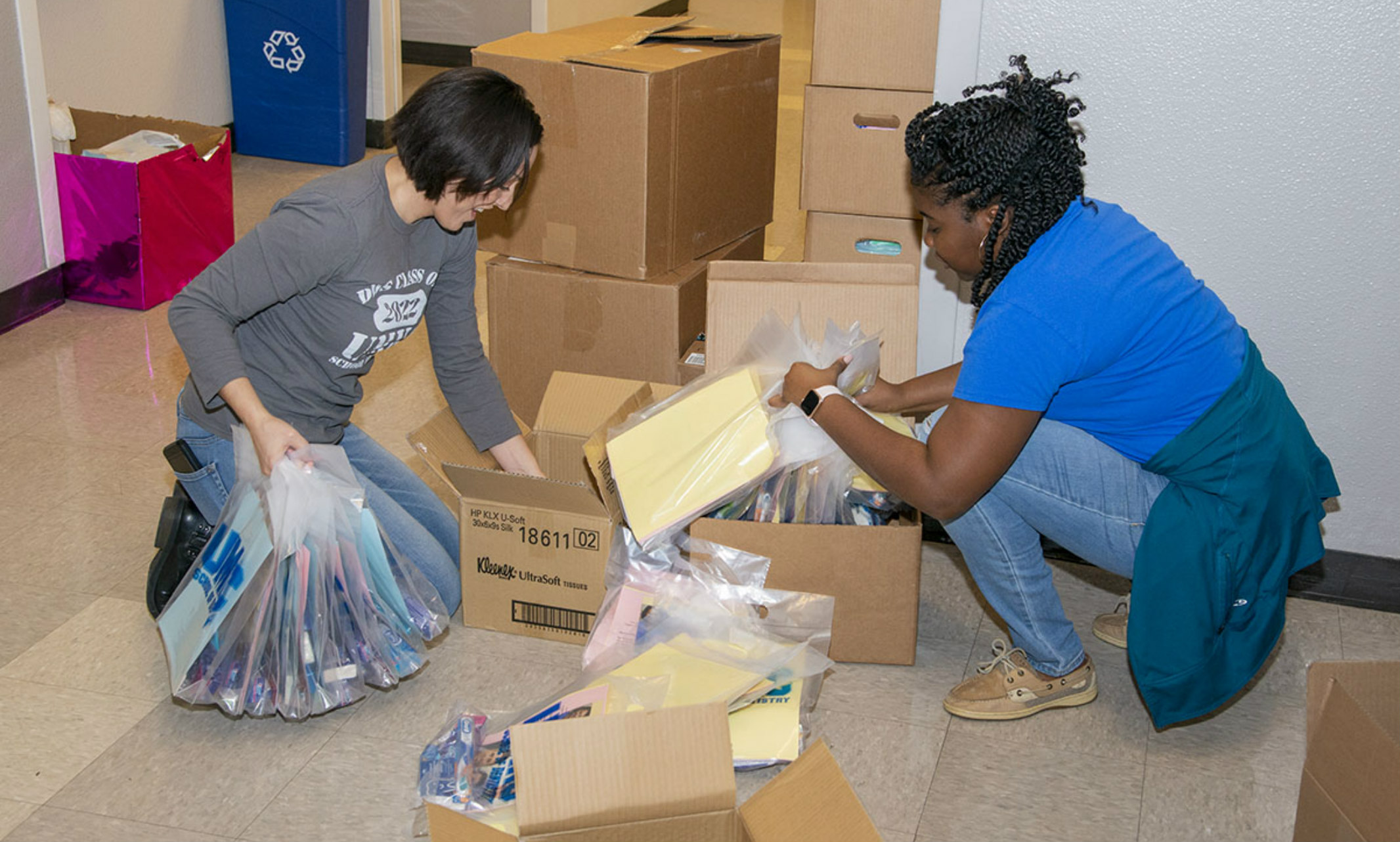
Students, faculty and staff assemble 2,000 dental-supply kits
From the outside, the UMKC School of Dentistry looked quiet Monday morning, befitting a day when classes were out and its clinics were closed. But inside, the cafeteria and second-floor hallways were abuzz with volunteers doing service befitting Martin Luther King Jr. Day.
The volunteers’ mission: assemble 2,000 dental-care supply kits for distribution to points of need throughout the community. It was the second year for the dental school’s MLK Day of Service, and the number of kits was double the output of a year ago.
“It’s great to see everyone here volunteering,” said Shurouk Alkharabsheh, a third-year dental student. “I missed last year and wanted to take part this time. It’s good to do something productive with the day.”
Ryan Greenway, a second-year dental student, agreed: “I enjoy volunteering, and was bummed when I missed the event last year. But now I’m here! It’s also a nice break from our routine.”
Students got the dental-kit day of service going a year ago, and it has had the full support of School of Dentistry leadership. Dean Marsha Pyle was on hand Monday morning and took a brief break from her assembly line to praise the effort.
“I’m grateful that our faculty, staff and students have created this opportunity to do good in the community,” Pyle said. “It’s a team effort — and Kansas City loves its teams! It’s great to see this special effort on this special day, when we don’t have our usual commitments.”
Most of the kits were packed with an average adult in mind, with items including a toothbrush, toothpaste, floss and information on the school’s clinical services and free dental cleanings available to the public. But one station packed kits suited to children, and another included supplies of use to older residents and people with dentures.
“I’m a big believer in volunteering, so this fits right in with my ideas. I participated last year and really enjoyed the sense of community.” - Mark Dallas
Richie Bigham, assistant dean for student programs, said the kits were bound for several places, including the City Union Mission, a program to help the homeless that’s on the original site of the dental school. The school also added a sock drive this year, as socks are an often-requested item at some of the locations that receive the dental kits.
Just as the kits will benefit the wider community, the volunteer corps this year drew from outside the dental school. One group came from St. James United Methodist Church, which also was sending volunteers to other locations around Kansas City for MLK Day.
“We’re happy to help here at the School of Dentistry,” said one parishioner, Phyllis Jackson, “and we have other volunteers today at Hospice House, Rose Brooks, Harvesters and other locations to honor the memory of Dr. King.”
Faculty and staff from the School of Dentistry rounded out the volunteers, including Mark Dallas, M.S., research assistant in the Department of Oral and Craniofacial Sciences.
“I’m a big believer in volunteering, so this fits right in with my ideas,” said Dallas, who joined the school in 2001 along with his wife, Professor Sarah Dallas, Ph.D. “I participated last year and really enjoyed the sense of community.”
The volunteers had started the day at 8:30 a.m. with a half-hour video on Dr. King’s legacy, and then they made fast work putting the kits together. By 11 a.m., they reassembled to be thanked by Jeffery Primos, director of business affairs, and then to make their first delivery, to nearby Ronald McDonald House.
The project will make a difference for hundreds of people, Primos said, “and embody what Martin Luther King Jr. stood for.”
Jan 20, 2020
Fox4KC interviews UMKC School of Dentistry
The UMKC School of Dentistry prepared to give away 2,000 dental hygiene kits. Learn more.
Jan 20, 2020
Startland News features UMKC Innovation program
Funded by the city of Kansas City, Missouri, and administered by the UMKC Innovation Center, the new Dare to Venture Micro-Grant Competition is expected to feature numerous prizes with a top winner earning at least $5,000. Read more.
Jan 15, 2020
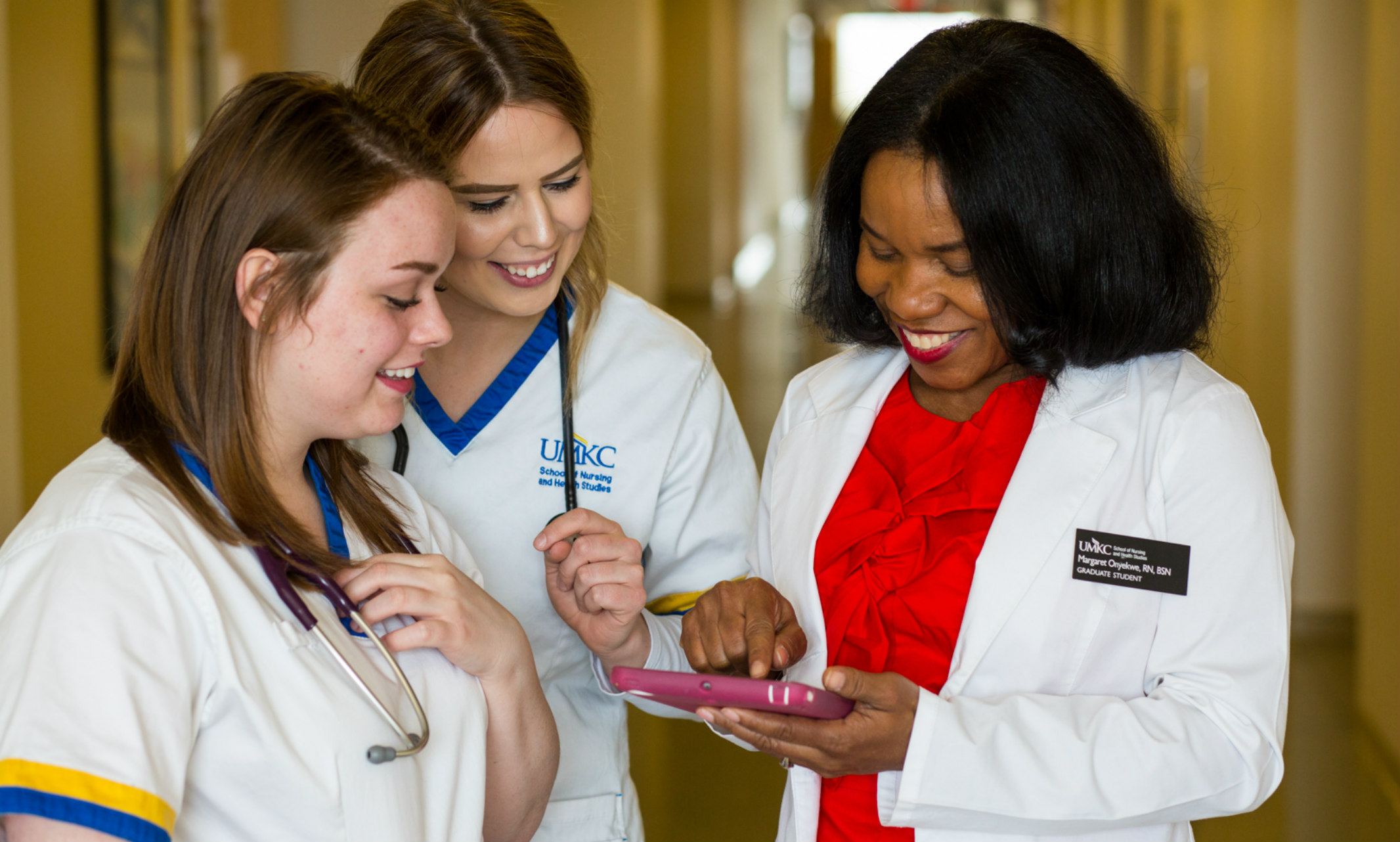
U.S. News & World Report ranks online graduate programs
The University of Missouri-Kansas City School of Nursing and Health Studies ranked No. 26 among the nation’s best online graduate nursing programs of 2020 by U.S. News & World Report, giving it at least a Top 30 ranking for the eighth year in a row.
The UMKC ranking, released today, is the highest of any university in Missouri or Kansas. Last year, UMKC also ranked high at No. 19.
“The UMKC School of Nursing and Health Studies is proud that our online Master of Science in Nursing (MSN) program continues to be recognized as one of the best in the nation," said Joy Roberts, interim dean. "For the past two decades, UMKC MSN graduates have been demonstrating excellence in nursing care throughout Missouri, Kansas and the Midwest."
The UMKC School of Nursing and Health Studies is a pioneer in distance-learning programs, offering online advanced degree programs since 2002. The programs offer busy professionals a high-quality but convenient way to further their careers and meet the needs of an evolving health-care system.
Online students are expected to participate in online discussions as if they are present in the classroom. Technology offers two-way communication in real time via multiple modes. Students also experience on-site learning through summer institutes where they are required to attend clinical training or dissertation work sessions, and deliver presentations to classmates and faculty.
UMKC offers a variety of online graduate nursing tracks, including Master of Science in Nursing (MSN) and other options:
Adult-Gerontology Primary Care Nurse Practitioner
Family Nurse Practitioner
Pediatric Nurse Practitioner
Women’s Health Nurse Practitioner
Nurse Educator
Psychiatric Mental Health Nurse Practitioner
Neonatal Nurse Practitioner
Ph.D.
Doctor of Nursing Practice
U.S. News began ranking online education in 2012. The categories include faculty credentials and training; student engagement; admissions selectivity; peer reputation; and student services and technology. U.S. News began their data comparisons with more than 550 institutions that had accredited graduate degree programs in nursing. Among the ones that replied, more than 180 said they offered online graduate nursing programs. The number of online nursing programs is continually growing nationwide.
Jan 14, 2020
$200,000 Urban Institute grant supports corrections research, offender rehabilitation
University of Missouri System researchers will play a central role in a new initiative aimed at improving the prison environment in Missouri. This week the Urban Institute, with support from Arnold Ventures, announced a $200,000 grant to support a collaborative effort between university researchers and the Missouri Department of Corrections.
Missouri was one of one five states chosen for phase 1 of the Prison Research and Innovation Network, along with Colorado, Delaware, Iowa and Vermont.
Janet Garcia-Hallett, assistant professor of criminology and criminal justice at the University of Missouri-Kansas City, is part of the research team. The team, led by Kelli Canada and Clark Peters of MU, received an annual grant of $100,000 to support their work in the project. Canada and Peters co-founded the Center for Criminal and Juvenile Justice Priorities. Other researchers involved are Ashley Givens, assistant professor of social work at MU; Beth Huebner, professor of criminology and criminal justice at University of Missouri-St. Louis.
“We are excited to partner with the Department of Corrections on this important work,” Canada said. “This collaboration speaks to the land-grant mission of the University of Missouri, as our research findings will be put to use to improve lives in communities across the state.”
The researchers will conduct climate surveys and collect data to provide objective analysis to the Department of Corrections for the research pilot project.
“I am a firm believer in using research and data to make good decisions,” Missouri Department of Corrections Director Anne Precythe said. “We’re thrilled to work with the University of Missouri, to join the network and to implement evidence-based practices, policies and programs that advance our goal of improving lives for safer communities.”
The 4.5-year research project will be piloted at Moberly Correctional Center, a 1,800-bed minimum/medium-security facility located 35 miles north of Columbia, Missouri. The prison is the inaugural site of the Missouri Veterans Project and the state’s first dorm for veterans. It houses two intensive therapeutic communities for offenders committed to personal growth and sobriety. It provides opportunities for offenders to give back through programs such as Puppies for Parole and Restorative Justice. It also offers 48 courses and groups that build skills in areas such as anger management, parenting, employability preparation, cognitive interventions, addiction management and understanding the impact of crime on victims.
“We look forward to supporting Missouri in its efforts to employ research and data to improve prison culture, operations, and design while creating more humane and rehabilitative correctional environments,” said Nancy La Vigne, vice president of justice policy at the Urban Institute. “Missouri’s leadership and commitment to transparency and accountability will help spur lasting change for people who live and work in prisons.”
Jan 14, 2020
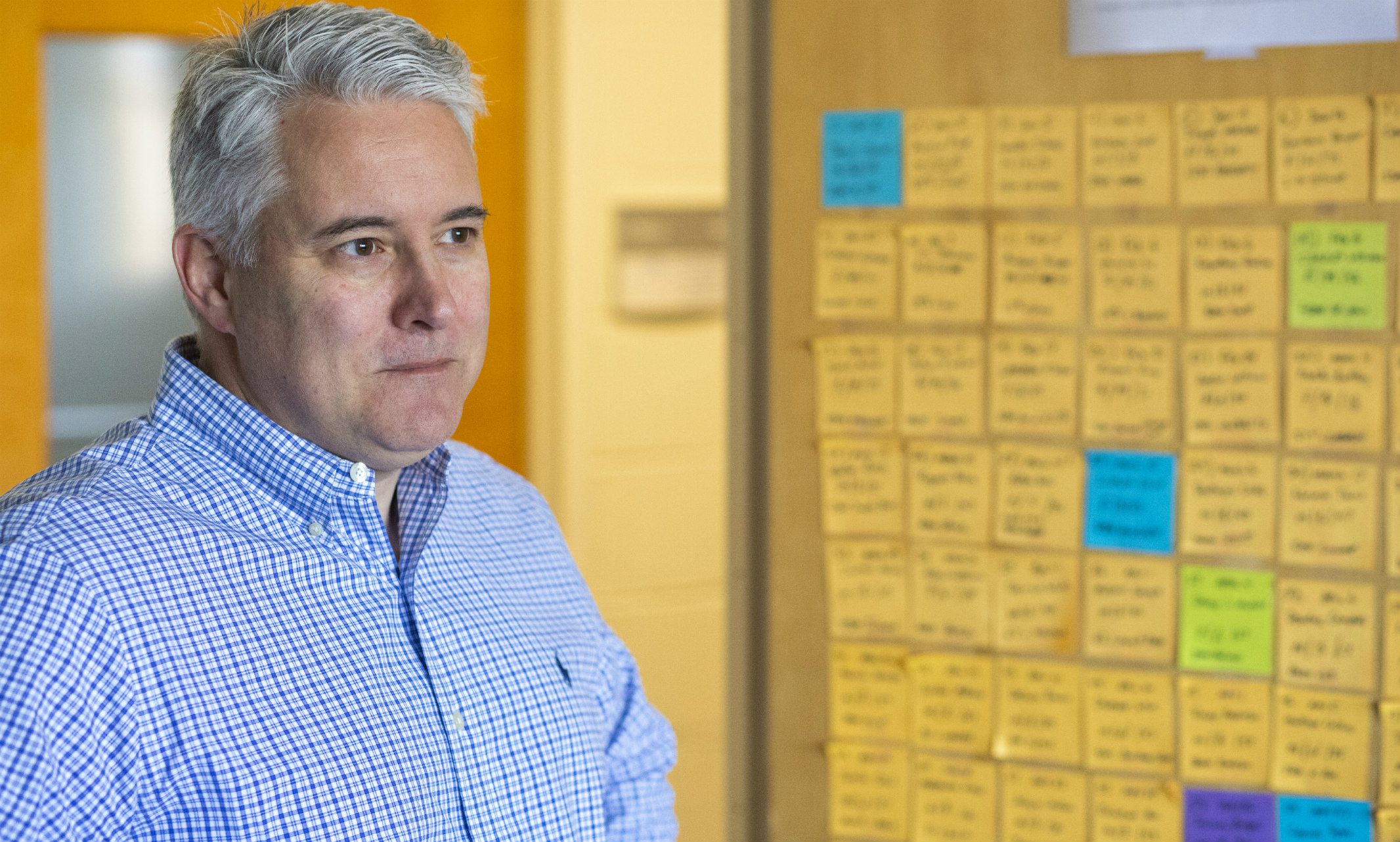
Seven questions with Ken Novak
In January 2019, criminology and criminal justice professor Ken Novak noticed an unusual pattern of homicide cases in Kansas City and casually decided to track them using color-coded sticky notes and posting them on his office door. He intended to spark a conversation.
On each note he recorded the date, victim name, victim demographic and the location. Orange for gun violence, blue for other, yellow for unknown and purple for officer-involved. He wanted students and colleagues to stop and ask questions, to take in what was happening and be led to help find a solution. He detailed his findings on Twitter at the start of 2020.
What stuck out to you the most about the homicide rate last year?
The thing that stuck out to me in general was the number of gun-related homicides – it’s clear that guns are involved in nine out of every 10 homicides.
“I hope this humanizes crime statistics. Behind every homicide is a victim and grieving families experiencing unimaginable trauma.”
151 homicides in one year? That’s a lot. Is that the highest it’s ever been?
There were several years in the 1990s when the raw number of homicides was higher. In fact, there were more homicides in 2017 than in 2019. But I believe it’s better to examine the population-adjusted homicide rates and compare Kansas City’s rates to national trends.
In the 1990s, the national homicide rate was almost twice as high as it is today. Since then, the national rate trended downward, where Kansas City’s homicide rate is stable. In 2019, Kansas City’s homicide rate was roughly six times higher than the national rate, and this disparity between Kansas City and the U.S. is the highest it has ever been.
What can we attribute to the heightened rate of gun violence in our city?
Several different factors contribute to the heightened rate of gun violence in Kansas City.
First: Research demonstrates that cities and counties in states with lenient gun laws have more gun homicides, even after considering other factors.
Second: There is a culture of gun violence in Kansas City, as well as in other urban areas in Missouri, perhaps due to the availability of guns. Using guns to settle disputes and arguments is normative in Kansas City, so we run the risk of viewing this violence as normal because it is what we have become accustomed to expect. Additionally, many homicides are a result of retaliatory violence. “Settling the score” with guns rather than the criminal justice system has become normalized behavior.
Third: Many affected by gun violence do not view the criminal justice system as effective, fair, impartial or transparent. Only about half of homicides are cleared by the police, and only about 20% of non-fatal shootings result in an arrest. When witnesses and victims don’t see people being held accountable for their actions, they are less likely to cooperate with detectives and prosecutors. Add in the fact that witnesses and victims may also fear retaliation if they cooperate, their motivation to collaborate with the police goes down even further. It’s a vicious cycle.
“There is no single solution to this problem, and there is no single strategy we can implement...”
Your goal when you started posting these notes on your door was to start a conversation and you’ve done just that, especially with the recent wave of media coverage after your Twitter thread. What do you hope the community will take away from your findings?
I hope this humanizes crime statistics. Behind every homicide is a victim and grieving families experiencing unimaginable trauma. It’s easy to lose sight of this fact. I also wanted to draw attention to how homicide victimization clusters by demographics. Young black males experience a disproportionate amount of victimization – about 95 times higher than the general U.S. population. The burden and trauma of homicide is not shared equally across everyone in KC.
You were previously on the board for KC NOVA (the Kansas City No Violence Alliance). What community initiatives are you currently involved in to help solve criminal justice issues in Kansas City?
I am currently working with the Kansas City Police Department on a hot-spot policing initiative in the most violent areas in eastern Kansas City — where many of these shooting occur. I am also working with the police and the Bureau of Alcohol, Tobacco and Firearms on an initiative to link shootings by examining ballistic evidence left behind at crime scenes. Both of these are sponsored by the U.S. Department of Justice.
“In 2019, Kansas City’s homicide rate was roughly six times higher than the national rate, and this disparity between Kansas City and the U.S. is the highest it has ever been.”
Interesting! We’re looking forward to hearing more about those initiatives as they progress. What about those of us in the community? What can we do to help solve the gun violence issue?
There is no single solution to this problem, and there is no single strategy we can implement. Kansas City needs a violence-reduction portfolio of strategies. We have learned some crime prevention strategies work better than others do and, over time, science has developed evidence-based solutions to reduce crime. Citizens should demand evidence-strategies be given priority within this portfolio.
You mentioned that you started this as a casual effort. Are you planning to do it all again this year?
I don’t think I’m going to do this in 2020. I never intended this to be an annual exercise.
Learn more about faculty research
Jan 13, 2020
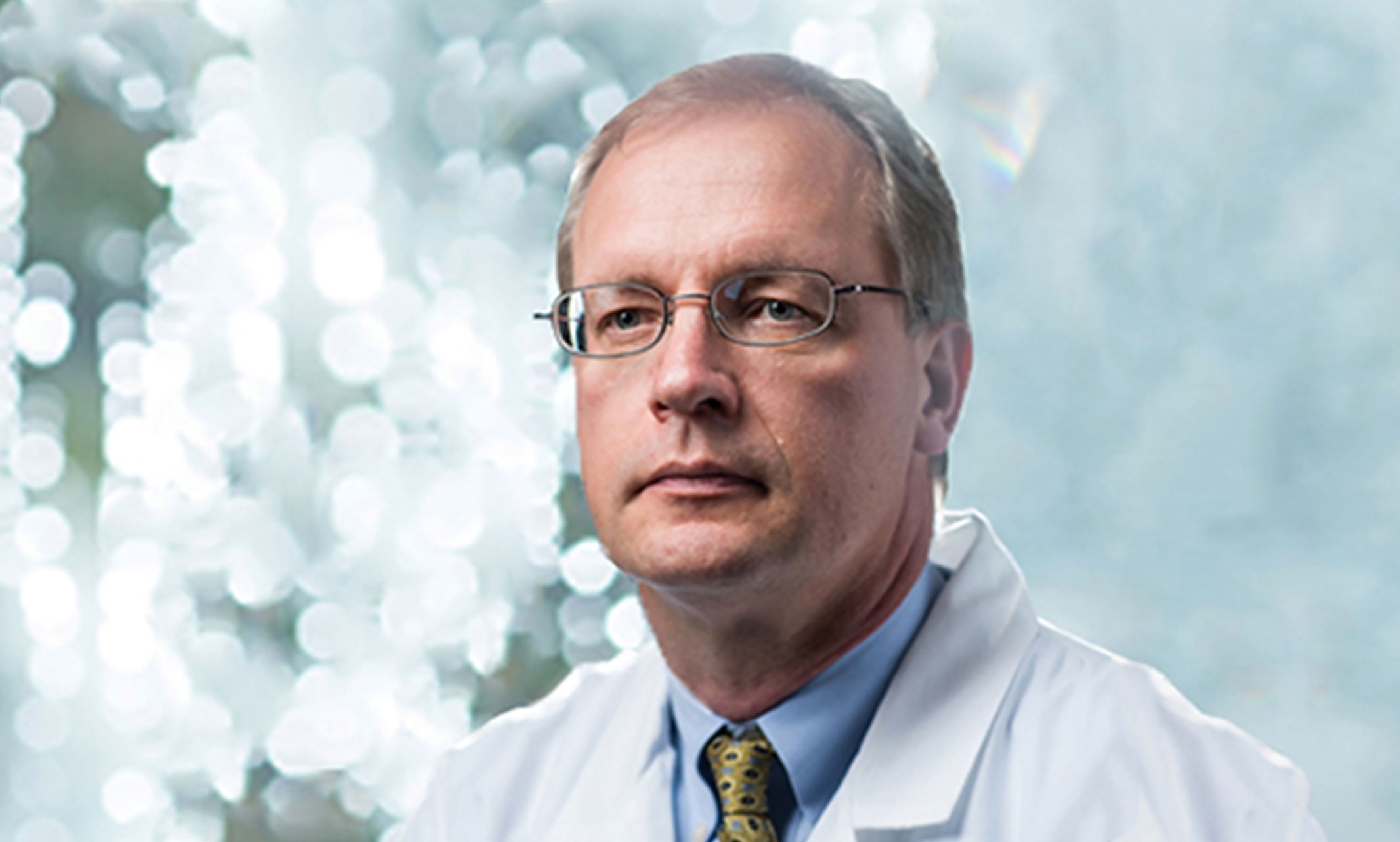
$1.16-milion NIH grant award explores macular-degeneration treatment
Backed by a $1.16 million grant from the National Institutes of Health, UMKC School of Medicine vision researcher Peter Koulen, Ph.D., is studying new chemical compounds to treat and prevent age-related macular degeneration (AMD).
AMD is the leading cause of irreversible vision loss and blindness among older adults. As many as 11 million people in the United States have some form of age-related macular degeneration.
“AMD affects a significant and increasing portion of the U.S. population, with age being a predisposing factor,” said Koulen, director of basic research at UMKC’s Vision Research Center. “This research will contribute to improving health care and the prevention of blindness.”
His project, funded by the NIH National Eye Institute, will focus on the preclinical development of novel antioxidants that have the potential to be both preventative and therapeutic in nature. The compounds could prevent the deterioration and death of retina nerve cells and supporting cells. The retina cannot regenerate these cells, therefore, their loss as a result of AMD leads to irreversible damage to one’s vision.
If successful, these new antioxidants being developed by Koulen’s research would be effective in both preventing the disease from progressing and treating already existing damage.
The research focuses on dry AMD, a form of the disease that affects the majority of patients. Effective therapies are lacking for this form of the disease, in which cells are gradually lost over time resulting in blindness.
Medications developed as a result of the study could also complement existing treatment designs for the wet form of AMD that is more aggressive and affects a smaller number of patients.
Jan 10, 2020
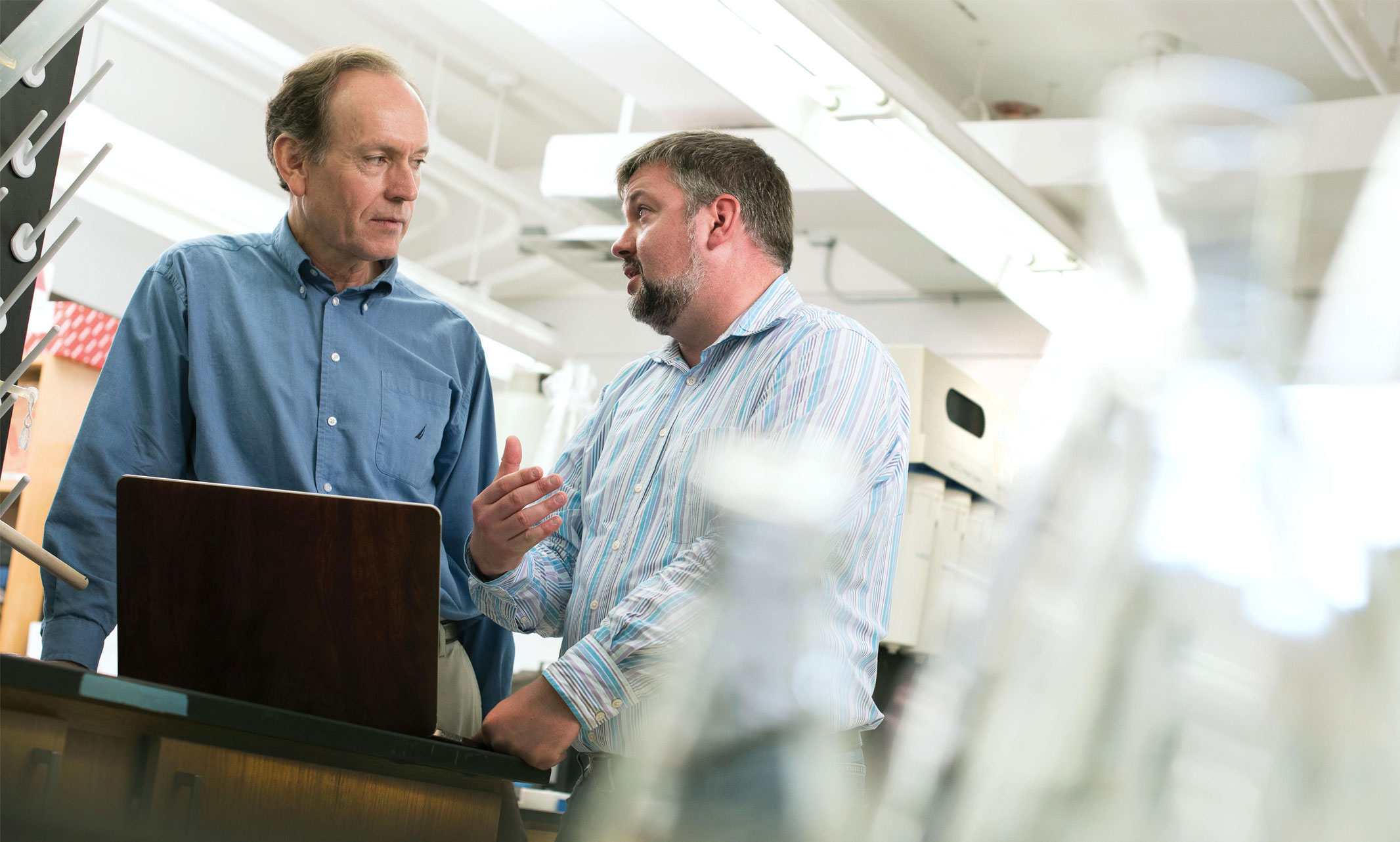
Gerald Wyckoff is one of three local scientists awarded nexus of human and animal research funding
BioNexus KC and the Hall Family Foundation awarded Nexus of Human and Animal Health Research Grants to three local researchers including Gerald Wyckoff, Ph.D., professor at UMKC.
Each researcher was given $50,000 to further the Path to 2025 regional vision: Kansas City is a global leader at the nexus of human and animal health benefitting all our citizens and the economy. This nexus is called One Health.
Wyckoff, with the joint University of Missouri-Kansas City and Kansas State University 1Data project, will work on creating a set of highly curated potential therapeutic target genes for rare disease. Wyckoff works with the School of Pharmacy and School of Biological and Chemical Sciences.
Building on this, the project will construct an algorithmic approach to screening for new therapeutics in over 3,400 rare disease genes, creating a new resource and tool for precision medicine in the rare disease space. By taking a One Health approach, and using computational techniques, 1Data plans to address the major problem of the lack of availability of treatments for rare disease and do so in a way that benefits both animal and human health.
Jan 07, 2020
KCTV5 interviews Rebecca Best, an assistant professor of political science
According to UMKC Assistant Professor of Political Science Rebecca Best, Soleimani’s position would be comparable to a well-known general in the United States. Read more.
Jan 03, 2020
Christopher Garmon of Bloch School interviewed
“It’s a really frustrating, powerless feeling for patients,” said Chris Garmon, an economist at the University of Missouri-Kansas City who previously worked on antitrust investigations at the Federal Trade Commission.
The Mercury
Lawrence Journal-World
Jan 03, 2020
Local media feature Professor Ken Novak
Part of Kansas City’s homicide rate likely stems from accessibility to handguns, said Ken Novak, a professor of criminology and criminal justice at the University of Missouri-Kansas City. His office door is covered in Post-it Notes. Each one has the name of a 2019 homicide victim on it.
The Kansas City Star
KCTV5
KSHB
Kansas City Business Journal
Jan 02, 2020
School of Medicine faculty interviewed by local media
Many who set goals for the new year place top priority on becoming healthier. Now a national study can help take the guesswork and expense out of accomplishing a more active lifestyle. The University of Missouri-Kansas City is one of five research sites in the U.S. for this study, which focuses on helping those at risk for metabolic syndrome.
Betty Drees, a professor with the UMKC School of Medicine’s Department of Biomedical and Health Informatics; and Jannette Berkley-Patton, a UMKC professor and director of both the Community Health Research Group and the Health Equity Institute, were interviewed.
The Community Voice
KSHB
Jan 02, 2020
